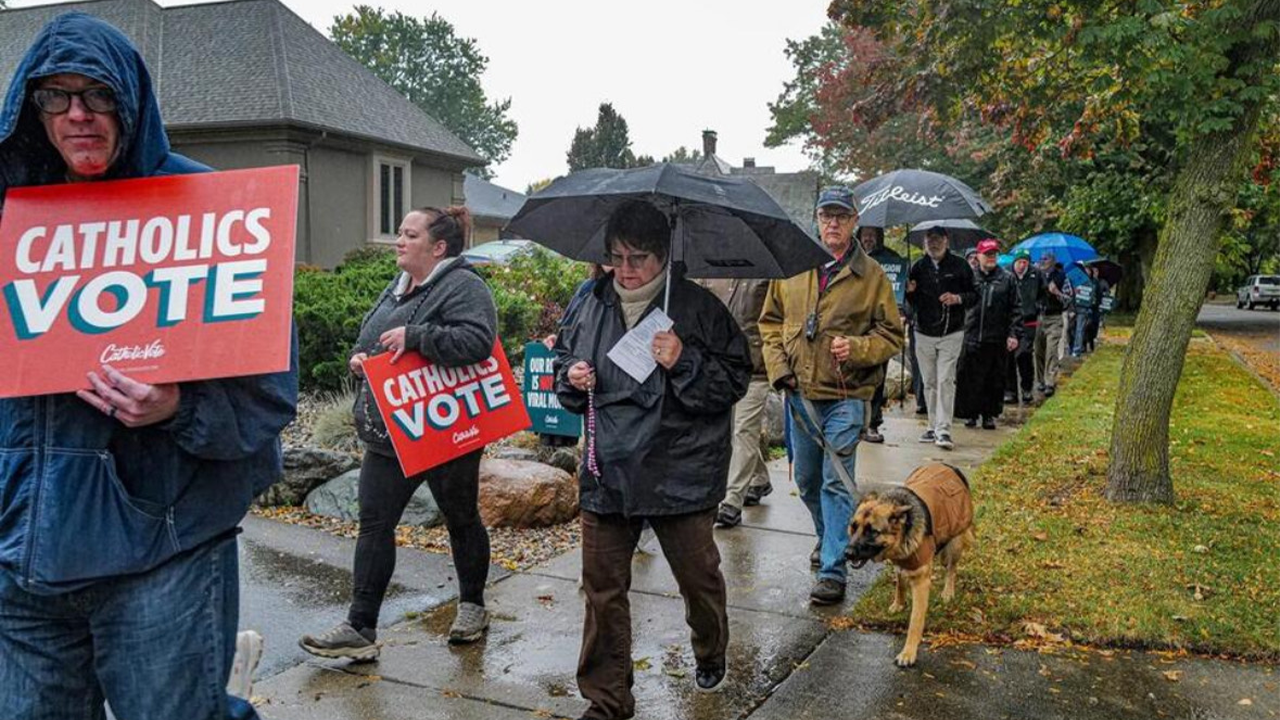Arizona
An Election for a Little-Known Agency Could Dictate the Future of Renewables in Arizona – Inside Climate News

PHOENIX—Approval of the construction of two gas power plants without public comment.
Another’s expansion approved without an environmental review.
New fees for homeowners with rooftop solar that the Arizona attorney general has called “discriminatory” and “unconstitutional.”
Approval of an 8 percent rate increase for customers of Arizona’s largest utility, largely to cover the costs of expanding its grid despite the availability of cheaper options.
The gutting of the utility’s plan to provide financial support for communities impacted by the closures of coal-fired power plants.
And all of that in just the past year.
Explore the latest news about what’s at stake for the climate during this election season.
Those decisions by the Arizona Corporation Commission (ACC) have drawn an outcry from environmentalists and the state’s attorney general, spawned lawsuits and prompted public campaigns by climate advocacy groups to hold the commission and Arizona Public Service Co., the state’s largest utility, accountable for continuing to use fossil fuels for electricity generation in Arizona.
In previous years, APS has invested tens of millions of dollars in influencing ACC elections.
But this November, the ACC’s actions and the responses to them will play a pivotal role in determining who will be elected to the commission, which advocates say has the potential to dictate Arizona’s climate and renewable energy future more than any other vote for office holders in the state.
“When it comes to mitigating climate change … the corporation commission plays a huge role in that,” said Emily Doerfler, a clean energy attorney with Western Resource Advocates who represents the climate-focused nonprofit in Arizona.
Created in 1912 under the state’s constitution, the Arizona Corporation Commission regulates the state’s water and power utilities and determines how much customers can be charged, how much profit utilities can make and how Arizona’s power grid is built and operated, along with other responsibilities. The state is one of 10 where the commissioners are elected and are separate from the state’s other branches of government, meaning only elections and lawsuits can hold them accountable. In 2022, Republicans took four of the commission’s five seats, giving them a supermajority. But three seats are up for election this year, setting the stage for a possible shift of the commission’s balance of power in one of Arizona’s most important, but often forgotten government entities.
The election comes on the heels of the ACC approving two more gas-powered plants and yet another summer of record-breaking heat in Phoenix, with over 100 days straight of temperatures exceeding 100 degrees Fahrenheit, resulting in 339 confirmed heat-related deaths and another 336 cases under investigation.
Six candidates—three Democrats and three Republicans—are vying for the three spots. Only one candidate, Republican Lea Marquez Peterson, is running for reelection.
In interviews and debates, Marquez Peterson and her Republican running mates, Rene Lopez and Rachel Walden, have defended the current commission’s approval of rate increases, citing the need to maintain grid stability, which they argue requires a “balanced” energy portfolio, including fossil fuels.
“The reality is, as Arizona continues to grow, whether it’s residential growth or we have this long line of data centers and semiconductor industries that want to come to this state, we need to prepare for that energy demand, and that is why energy reliability needs to be our No. 1 factor,” Marquez Peterson said during a debate on Sept. 3.
The three ACC Republican candidates (from left): incumbent Lea Marquez Peterson, Rene Lopez and Rachel Walden. Credit: Joe Rondone and Diannie Chavez/Arizona Republic
The Republican candidates have also downplayed the energy sector’s role in contributing to greenhouse gas emissions and argued that creating a mandate for renewables would raise rates further. About a quarter of the country’s emissions come from electric power, according to data from the U.S. Environmental Protection Agency.
Democratic candidates Ylenia Aguilar, Jonathan Hill and Joshua Polacheck have campaigned on allowing the free market to dictate Arizona’s energy sources, which they say would favor solar and other renewable energy sources leading to lower emissions and costs, and they have attacked the current commission for failing to protect Arizonans from rising energy costs and climate change. They say they will stick up for customers when utilities ask to increase rates and work to address climate change by expanding renewables in the state.
“Arizona is not known as an oil and gas capital of the country,” Hill, who is currently a mission planner at Arizona State University’s Mars Space Flight Facility, said during the debate. “We are the sunshine capital of the entire country. There is no reason why Arizona should not be running entirely on solar.”
The three ACC Democratic candidates (from left): Ylenia Aguilar, Jonathan Hill and Joshua Polacheck. Credit: Diannie Chavez and Joe Rondone/Arizona Republic
Polacheck, a former foreign service officer with the U.S. Department of State, said in an interview with Inside Climate News that the commission’s actions aren’t just affecting Arizonans today, but also future generations.
“The commissioners will be constructing the future of our state, and whether that state is going to be livable, whether it’s going to be a state where people can afford to raise their families and whether it’s a place where we can coexist with the environment,” he said.
Commission Decisions Frequently Controversial in Recent Years
Just a few years ago, it seemed Arizona was close to setting a path to relying on an electricity mix made up entirely of renewable energy by 2050 thanks to a bipartisan plan from the ACC to reach that goal.
But the plan ultimately unraveled. Since Republicans took four of the commission’s five seats in 2022, they have consistently approved new natural gas plants and are attempting to roll back what standards for renewable electricity still exist, though the state’s largest utilities have implemented their own clean energy goals.
This story is funded by readers like you.
Our nonprofit newsroom provides award-winning climate coverage free of charge and advertising. We rely on donations from readers like you to keep going. Please donate now to support our work.
Donate Now
The commission’s decisions have prioritized “making it easier for utilities to continue expanding and investing in fossil fuel infrastructure, which is historically much more profitable for them but much more expensive for ratepayers,” said Keriann Conroy, a research associate for the Energy and Policy Institute, a pro-clean energy watchdog organization. “And of course, has a lot of climate and health and environmental impacts.”
This year, two major actions have dominated the headlines about the commission. The first was a decision approving a rate hike from APS that increased customers’ bills by roughly 8 percent, while also adding a surcharge for rooftop solar customers. That action also allowed utilities to build new power plants without first going through a rate hike case that allows public comment on the plan. The second decision expanded UNS Electric’s natural gas-powered Black Mountain Generating Station without an environmental review, which reversed 50 years of precedent and a vote from the commission’s Line Siting Committee that required the project to undergo such a review.
The first action, climate groups argue, raised costs for customers to subsidize the utility’s continued consumption of fossil fuels despite its own studies finding that maintaining its coal-fired plants is uneconomical and that transitioning to renewables sooner would save it and ratepayers money. The ACC even went so far as to amend APS’s own plan, removing a $100 million fund the utility proposed for communities impacted by the coal-fired power plants eventually shutting down.


The Black Mountain Generating Station decision led to legal action. Western Resource Advocates, the Sierra Club and Arizona Attorney General Kris Mayes, a former corporation commissioner herself, separately filed lawsuits appealing the commission’s decision.
UNS Electric plans to add four new gas-powered plants to its Black Mountain facility at 50 megawatts each, for a total of 200 MW. The utility argued that it was not under the jurisdiction of the commission or subject to an environmental review because each of the plants was under 100 MW.
Arizona law requires a Certificate of Environmental Compatibility for power plants over 100 MW, and opponents of the ACC’s action say the new plants should be considered for their combined power output. The commission’s Line Siting Committee rejected the company’s argument in a 9-2 vote, arguing the commission had jurisdiction as the combined power of the plants at the single facility exceeded 100 MW. But the commissioners sided with the utility.
Doerfler, with Western Resource Advocates, said the ACC decision is just the latest example showing the commission has “abandoned” its constitutional duty to protect Arizonans, especially rural ones, “over and over and over again” to instead prioritize utility profits.
“The people of Arizona do not matter to the corporation commission,” Doerfler said.
As essentially the state’s fourth branch of government, the ACC almost exclusively has the power to either end or continue Arizona’s reliance on fossil fuels, she said. That would include decisions like whether to mandate a quicker end to coal-fueled plants like APS’s Four Corners Power Plant.
“That means that the emissions that are coming from this coal plant in the next year are almost directly in the hands of the Arizona Corporation Commission,” Doerfler said.
About This Story
Perhaps you noticed: This story, like all the news we publish, is free to read. That’s because Inside Climate News is a 501c3 nonprofit organization. We do not charge a subscription fee, lock our news behind a paywall, or clutter our website with ads. We make our news on climate and the environment freely available to you and anyone who wants it.
That’s not all. We also share our news for free with scores of other media organizations around the country. Many of them can’t afford to do environmental journalism of their own. We’ve built bureaus from coast to coast to report local stories, collaborate with local newsrooms and co-publish articles so that this vital work is shared as widely as possible.
Two of us launched ICN in 2007. Six years later we earned a Pulitzer Prize for National Reporting, and now we run the oldest and largest dedicated climate newsroom in the nation. We tell the story in all its complexity. We hold polluters accountable. We expose environmental injustice. We debunk misinformation. We scrutinize solutions and inspire action.
Donations from readers like you fund every aspect of what we do. If you don’t already, will you support our ongoing work, our reporting on the biggest crisis facing our planet, and help us reach even more readers in more places?
Please take a moment to make a tax-deductible donation. Every one of them makes a difference.
Thank you,

Arizona
Brent Brennan Challenges Arizona Wildcats To Respond Following Tough Stretch

Things have a chance to come off the rails for the Arizona Wildcats.
Entering the year ranked No. 25 in the country coming off their 10-win season, the thought was, with so many star players returning, they would be able to build upon that showing and compete in the Big 12 Conference during their inaugural campaign.
Through six games, that has not been the case.
Arizona sits with a 3-3 record, having been completely dismantled against Kansas State and BYU, dropping a winnable game at home against Texas Tech, while also looking incredible in their opener against New Mexico and during their upset over 14th-ranked Utah.
That’s the most frustrating thing about this Wildcats team.
They have shown the ability to put together solid performances, but have also looked borderline horrible at times.
Arizona has a tough stretch ahead of them, facing an improved Colorado team and a solid West Virginia group, before going on the road to face UCF in a tough place to play.
Brennan knows his team is at a crossroads, and has challenged them to respond.
“We’re halfway through the football season, and we have a ton of football left to play. We have a choice to make. We have so much football left to play … What are we going to do with it? What are we going to do with these six opportunities? And our teams needs to make a strong, firm choice in which direction we’re going to move,” he said after the 41-19 loss against BYU per Justin Spears of The Arizona Daily Star.
The Wildcats have to win three out of their final six contests to become bowl eligible and play in the postseason in the back-to-back years for the first time since they accomplished that feat four times in a row from 2012-15 when Rich Rodriguez was the head coach.
It’s going to be tough.
Noah Fifita has been one of the most disappointing players in the country, which has clearly affected his confidence. He addressed his struggles by saying he needs to improve, but until that happens on the field, Arizona will continue to have some issues.
Still, Brennan is confident in this group and thinks they can turn things around.
“When you go through a couple of losses like that, that are both hard ones, the challenge is to stay together and not let the outside forces of the world pull us apart. The one thing that is really powerful about these young men, is they are a true brotherhood. I’m excited to see how we come to work,” he added.
They have a chance to do that at home against Colorado on Saturday in front of their home fans who are celebrating the homecoming game.
Arizona
Arizona State football just outside AP Top 25 after win

Following a win over then-No. 16 Utah, Arizona State football almost has its first appearance in The Associated Press’ Top 25 under Kenny Dillingham.
The win on Friday kicked the Utes out of the poll, who received seven points among others receiving votes to ASU’s 39. Only Vanderbilt (68) and Nebraska (62) are ahead on the outside looking in.
The Sun Devils earned the second-most votes among those outside the poll in the Coaches Poll, while Utah was knocked down to two spots below them.
ASU is 5-1 overall and 2-1 in the Big 12 with a 9 a.m. road matchup with Cincinnati on the docket for a chance to secure the program’s first bowl-eligible season since 2021.
The conference has three teams ranked in the AP poll between No. 9 Iowa State, No. 13 BYU and No. 17 Kansas State. The Sun Devils play Kansas State and BYU in the two weeks leading up to the Territorial Cup against Arizona, which did not receive votes after falling to 3-3 after a loss to the Cougars.
Texas Tech, who is responsible for the Sun Devils’ only loss thus far, collected 18 votes to be the closest Big 12 team behind the Sun Devils.
Oregon and Penn State move on up
Oregon and Penn State each moved up a spot following thrilling wins in high-profile games, and Top 25 newcomers Navy and Army are in the rankings together for the first time since 1960.
Texas strengthened its hold on No. 1 with its 31-point victory over Oklahoma. The Longhorns received 56 of 62 first-place votes, four more than last week and their most since they were a unanimous No. 1 in October 2008.
Oregon’s 32-31 home win over Ohio State featured seven lead changes and moved the Ducks to No. 2 with the other six first-place votes. It’s their highest ranking since they ended the 2014 season at No. 2 after losing to the Buckeyes in the inaugural College Football Playoff championship game.
Penn State rose to No. 3 with a 33-30 overtime win at Southern California, the Nittany Lions’ highest ranking in seven years.
Penn State-USC was one of four games involving AP Top 25 teams that went to OT on Saturday, including three in the top 10.
Ohio State dropped two spots to No. 4 and Georgia remained No. 5. Miami, Alabama, LSU, Iowa State and Clemson rounded out the top 10.
Army, which beat UAB 44-10, and Navy, which was idle, broke through for their first simultaneous rankings since Oct. 3, 1960.
Their coinciding appearance that season lasted just one week. Army was 3-0 and ranked No. 18 before dropping two straight games and finishing 6-3-1. Navy had entered the rankings a week earlier, at No. 17, and ended the season 9-2 and ranked No. 4.
Army (6-0) and Navy (5-0) have not each been unbeaten at this point in a season since 1945, weeks after World War II ended and in the era when service academies were powerhouses of the sport.
- Texas (56)
- Oregon (6)
- Penn State
- Ohio State
- Georgia
- Miami
- Alabama
- LSU
- Iowa State
- Clemson
- Tennessee
- Notre Dame
- BYU
- Texas A&M
- Boise State
- Indiana
- Kansas State
- Ole Miss
- Missouri
- Pittsburgh
- SMU
- Illinois
- Army
- Michigan
- Navy
Others receiving votes: Vanderbilt (68), Nebraska (62), Arizona State (39), Oklahoma (36), Washington State (32), Iowa (29), Texas Tech (18), Syracuse (13), Arkansas (13), Utah (7), Louisville (6), USC (5), Liberty (2), UNLV (1).
The Associated Press contributed to this report.
Arizona
Dueling yard signs, shifting loyalties and the quest for Mormon votes in Arizona

Jeremy Spilsbury never suspected that anything was off. He attended services at his local Church of Jesus Christ of Latter-day Saints ward, stayed for a meeting with the missionary committee and then bid them farewell — including his across-the-road neighbor.
But as Spilsbury pulled into his quiet, residential street in this Phoenix suburb of about 511,000, he noticed the neighbor’s new yard sign: “Cucks for Harris.”
Spilsbury did a double take. Then he googled the offending word.
A “cuck,” according to the Merriam-Webster dictionary, is “often used as an insulting and contemptuous term for a man who has politically progressive or moderate views.” The word has sexual connotations, too, meaning a man whose female partner is unfaithful.
Jeremy and Julie Spilsbury, left, react with other Latter-day Saints who are supporting the Harris-Walz ticket as they watch the vice presidential debate on Oct. 1 in a private residence in Phoenix.
(Gina Ferazzi / Los Angeles Times)
“When I found out what it meant, I was kind of appalled, because it’s obviously designed to be as offensive as possible,” said Spilsbury, who had a “Republicans for Harris-Walz” sign in his own yard.
The neighbor’s sign, while biting, underscored an emerging reality in Arizona’s sizable Latter-day Saints community — that while church members are overwhelmingly Republican, there is some erosion in their traditionally airtight support for Republicans.
“There has been a long-standing belief from people who have not been LDS that Mormons are homogeneous in their beliefs and their voting and the way they enact living their faith,” said Brittany Romanello, a cultural anthropologist at Arizona State University who has studied Mormon identity and was raised in the church.
Mormons were the most Republican-leaning religious group in the country, the Pew Research Center found in 2016. But “the politics and willingness to openly disagree with one another in these LDS spaces … is becoming more and more apparent,” Romanello said.
Vice President Kamala Harris’ campaign team is hoping to collect any stray votes — especially in Mormon-heavy battleground states such as Nevada and Arizona, where the church numbers about 443,000 members and polling shows Harris and Trump neck and neck. Harris appealed to Latter-day Saints members at an appearance in Scottsdale Friday, saying, “I am committed to all of you to be a president for all Americans.”
Her campaign in Arizona launched a Latter-day Saints advisory committee weeks ago, and another one in Nevada on Monday. Trump’s campaign announced a Latter-day Saints for Trump group Tuesday.
The budding Latter-day Saints groups for Harris are an aberration, said Tara Rowland, the neighbor with the “cucks” sign.
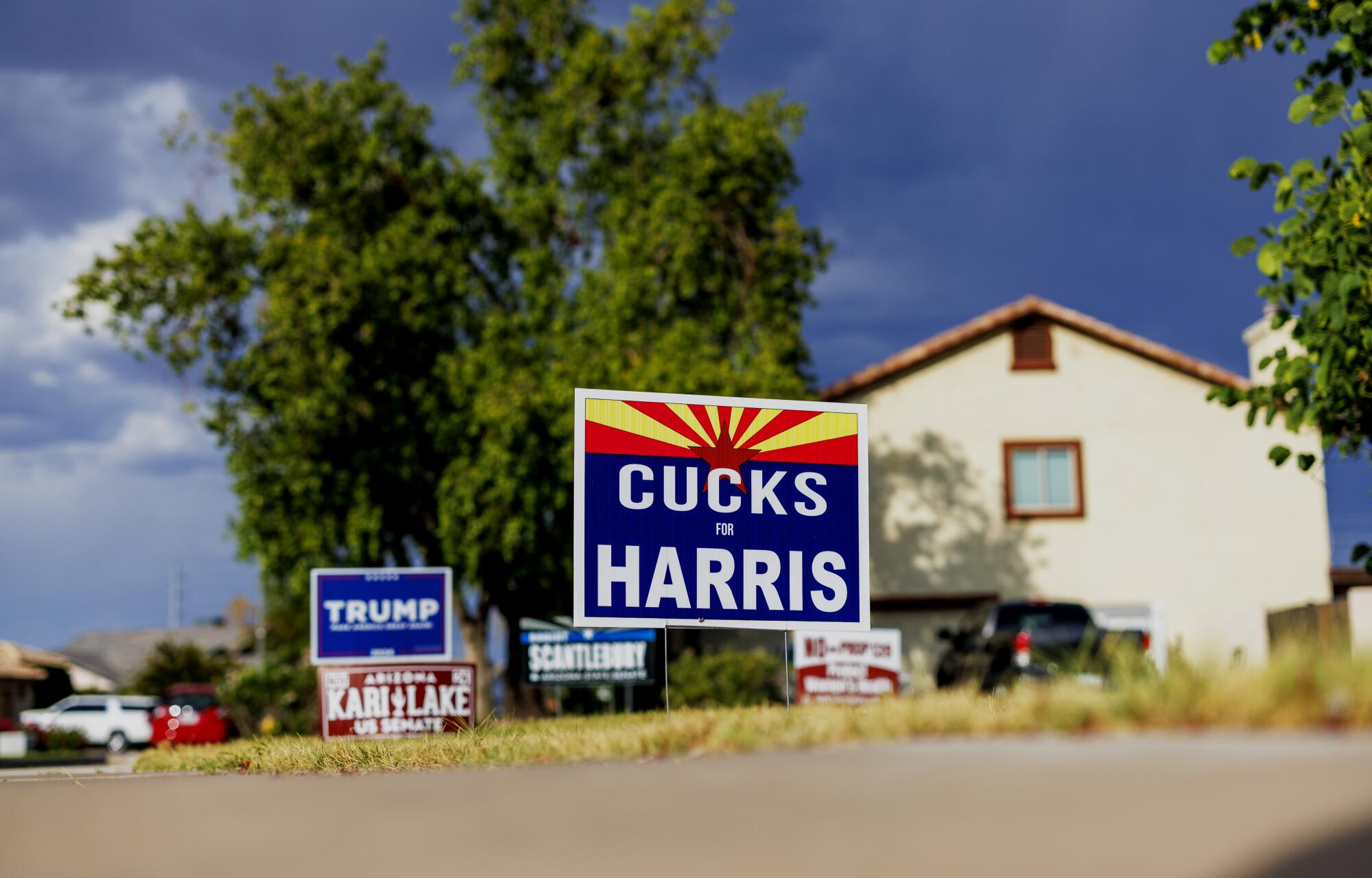
After Mesa City Council member and Mormon Julie Spilsbury put up a “Republicans for Harris-Walz” sign in her frontyard, her neighbor across the street, who is a Trump supporter, put up this derogatory “Cucks for Harris” sign on Oct. 1 in Mesa, Ariz.
(Gina Ferazzi / Los Angeles Times)
“They do not represent the majority,” she said. “There’s these few people in our congregation who everybody knows is full of it.”
The church takes pains to keep its official positions apolitical, and last weekend, one of its senior leaders, Dallin H. Oaks, encouraged members to be civil ahead of the November election. Despite its pledged neutrality, the church has waded into issues it considers moral, supporting conservative views on issues such as abortion and LGBTQ+ rights.
“Mormon socialization from a very young age encourages you to participate in civic engagement. The importance of voting … of being prayerful,” Romanello said. “And that means that you don’t align yourself with a particular party.”
Like many church members, Rowland has been active in politics since she was 14, mostly supporting Republicans, though she has voted for non-Republicans in local elections.
Although Trump “says stupid, clownish things, and he’s a buffoon,” Rowland said, “he’s the best choice of the two.”
“I believe that family and religion and God and the sanctity of life is important, and Trump is the most in line with our values,” Rowland said, adding about her neighbors, “If they were voting their values, they would not be voting for Harris-Walz.”
LDS for Harris-Walz
About a dozen Mormons gathered in a church member’s Phoenix living room recently for a “Latter-day Saints for Harris-Walz” vice presidential debate watch party.

Latter-day Saints who are supporting the Harris-Walz ticket gather to watch the vice presidential debate on Oct. 1 in a private residence in Phoenix.
(Gina Ferazzi / Los Angeles Times)
Within minutes of arriving, Jeremy and Julie Spilsbury were swapping names of congregants they shared in common with Bobby Parker, 79, who said he lost many of his ties to the community when he came out as gay about 20 years ago.
“It’s like being a Republican for Harris — you’re not supposed to fit!” Julie Spilsbury joked, and they all laughed.
For most of their lives, Jeremy and Julie Spilsbury were in step with their church’s political culture. They avidly listened to conservative talk show hosts Rush Limbaugh and Sean Hannity. They voted Republican — including for Trump.
But things started to change around 2020.
“He always jokes, it’s because of Trump that we’ve changed a lot of our thinking politically, religiously,” Julie Spilsbury said of her husband. “It’s actually been a good thing for us in our personal growth.”
In 2020, Jeremy Spilsbury was serving as bishop of his ward, a volunteer role in addition to his job running a small arborist business. When one of his employees assumed he was voting for Trump again, Spilsbury knew he didn’t want to keep quiet.
He typed up what would become the first of several Facebook posts, alerting his community to his new political views.
The backlash was almost immediate. Though few people confronted him in person, Spilsbury said he heard that many thought he had been “deceived.” Rowland said he “caused such a division between our congregation.” Congregants asked for him to be “released” as bishop (his term expired in 2021).
But he was committed to his increasing outspokenness. Soon, he quit his job to go back to school and study peace and conflict. He refused to leave the church or Mesa.
“To use a religious term, I’m a wolf in sheep’s clothing,” Spilsbury said. “There’s no one more dangerous than an insider pretending to be part of the group.”
Then Julie Spilsbury was elected to the Mesa City Council and a few months later, her first controversial issue reached the agenda: an ordinance prohibiting discrimination in public accommodations, employment and housing.
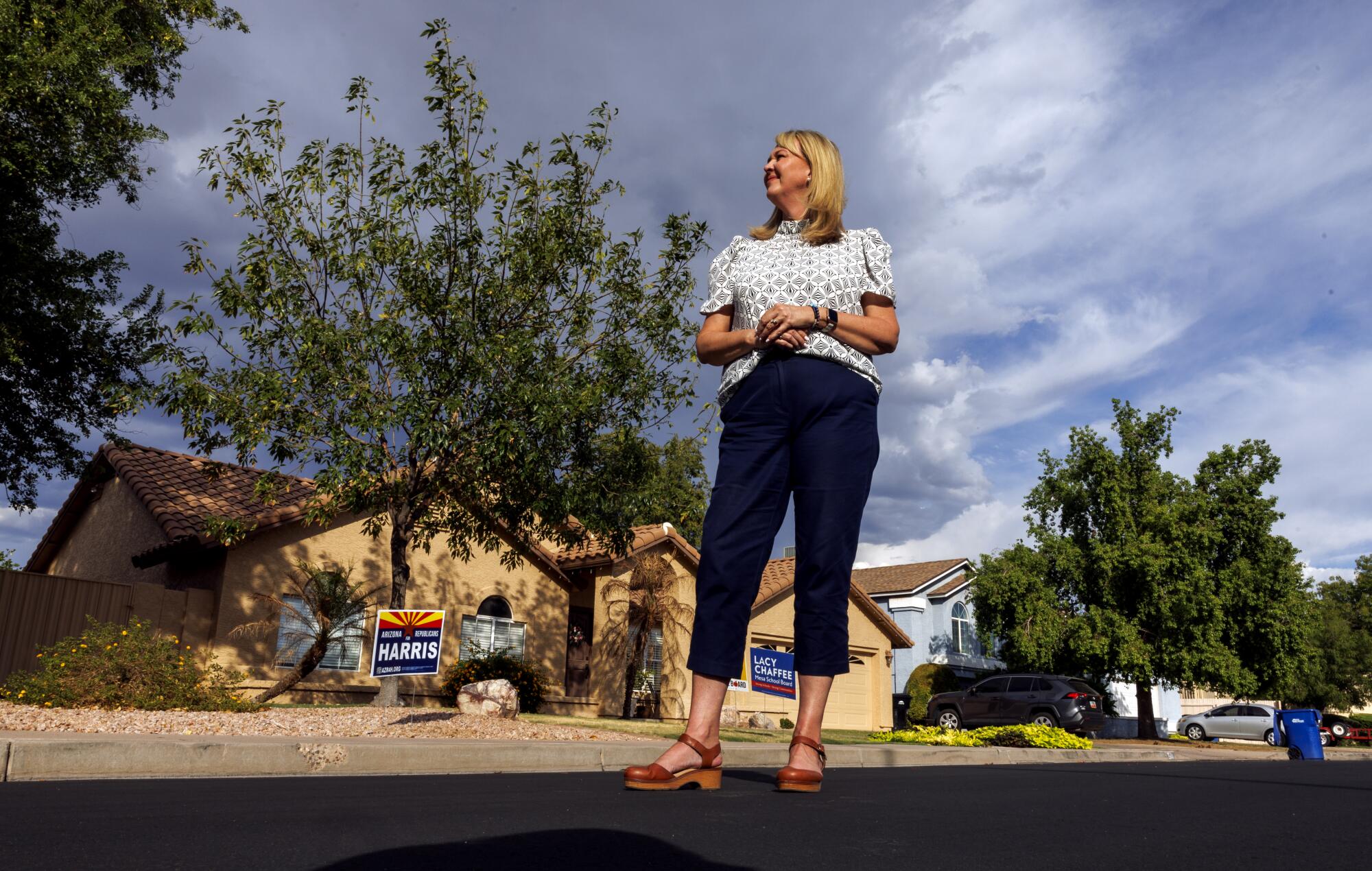
Mesa City Councilmember Julie Spilsbury, who is a member of the Latter-day Saints, is a Republican who supports the Harris-Walz ticket.
(Gina Ferazzi / Los Angeles Times)
The ordinance caused consternation across Mesa, home of the state’s first Latter-day Saints temple and a concentrated Mormon community in Arizona. A local representative of the church weighed in, signing a letter along with other interfaith leaders and Sen. Kyrsten Sinema (I-Ariz.) in support of the ordinance. But others, including Rowland, spoke against it at City Council meetings.
“Say a baker doesn’t want to make a cake for a transgender wedding or something like that,” Rowland said in an interview. “They should have the ability, that’s their business.”
“A lot of LDS people thought … ‘You’re doing something that’s contrary to our religious beliefs.’ When, in fact, that was 100% not true,” said Mesa Mayor John Giles, a Republican and church member. “The LDS church leadership is actually far more progressive than a lot of these traditional, kind of fundamentalist people in the church. And they just kind of refuse to acknowledge that they’re out of step with where the church is.”
The ordinance ultimately passed, and an attempt to put the issue to voters as a referendum was dropped.
“It’s something I’m very proud of, but I have a lot of people who hate me now because of it,” Julie Spilsbury told Parker at the watch party. She flashed her phone’s lock screen, featuring a bright, neon-colored rainbow flag.
“I was just amazed by how wonderful these people were, you know?” Jeremy Spilsbury said of the LGBTQ+ community. “I had all these preconceived notions growing up in the church. They’re perceived as a threat, you know, their lifestyles.”
“Lifestyle,” Parker repeated, chuckling. “I’m an old grandpa, great-grandpa. I like to wear short shorts, that’s my lifestyle.”
Mormon momentum
When Harris became the Democratic presidential nominee, a smattering of identity-based affinity groups burst into being, including the Latter-day Saints committees.
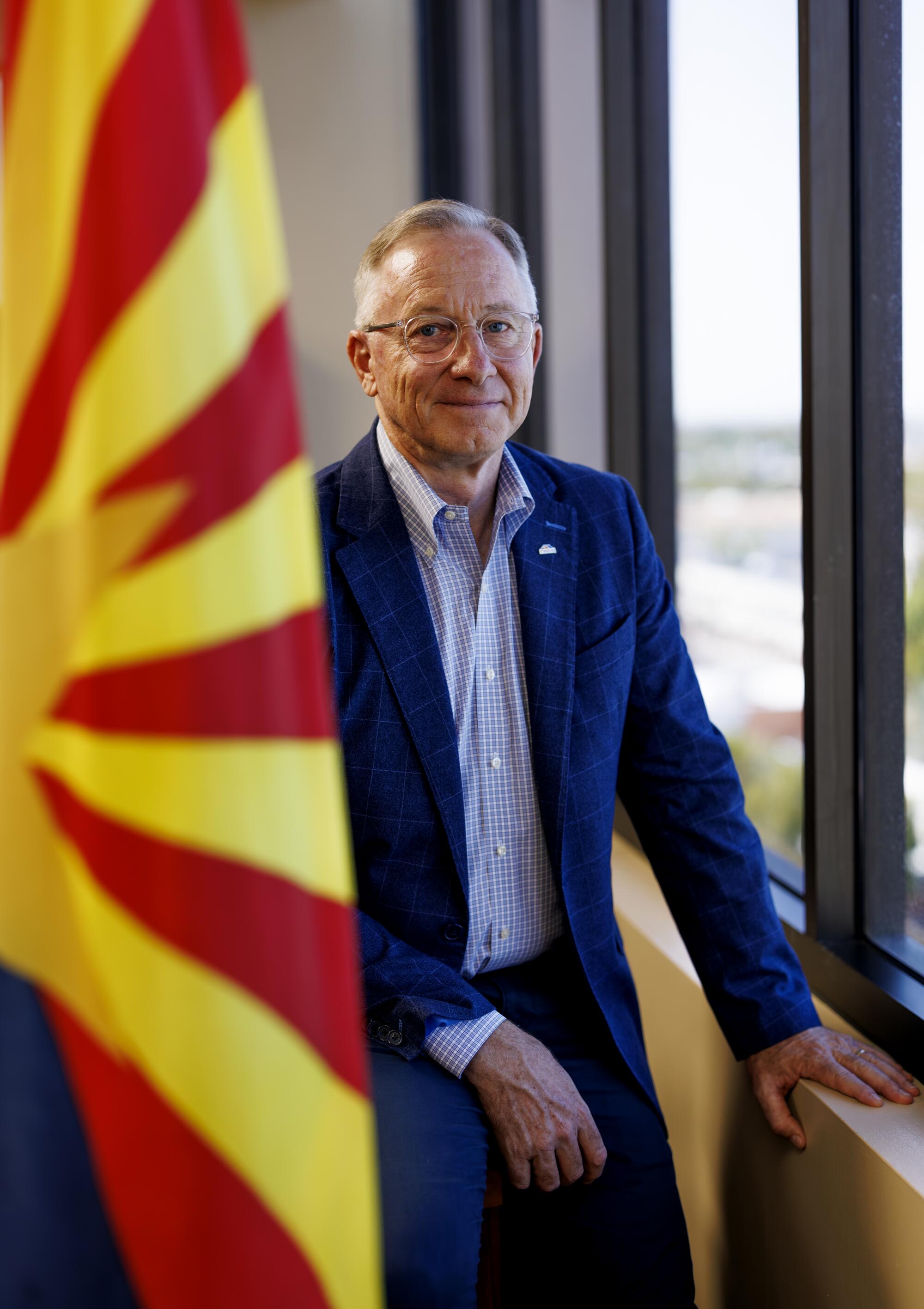
Mesa Mayor John Giles is part of Latter-day Saints for Harris-Walz and Republicans for Harris.
(Gina Ferazzi / Los Angeles Times)
Then Giles, who ruffled feathers when he endorsed Democrats Gov. Katie Hobbs and Sen. Mark Kelly in 2022, came out with a pro-Harris media blitz: penning an op-ed in the Arizona Republic, appearing on major news networks and capping it off with a speech at the Democratic National Convention, where he said, “The Grand Old Party has been kidnapped by extremists and devolved into a cult, the cult of Donald Trump.”
Giles has repeatedly been censured by the local Republican Party. But he shrugged off the criticisms. More important, he said, choking up, are the people who approach him in grocery stores, thanking him for voicing their feelings about politics and the party.
“The fact that I have an opportunity to maybe influence the outcome of an election is something that is just too compelling for me to not participate,” Giles said.
Other prominent Mormon Republicans emerged for Harris, too, such as former Arizona Sen. Jeff Flake. While he hasn’t formally endorsed Harris, Utah Sen. Mitt Romney is a vocal opponent of Trump.
That momentum, plus the Spilsburys’ “Republicans for Harris-Walz” sign, was too much for Rowland. The “Cucks for Harris” sign went up.
Jeremy Spilsbury shot off a text to his neighbors: “Hey, I’d love to come over and talk to you tomorrow about the sign that you have in the front yard. Is there a time that works for you?”
The next day, Spilsbury found himself sitting on a couch across from Tara Rowland and her husband, who could not be reached for comment for this article. Spilsbury said he asked them to take the sign down.
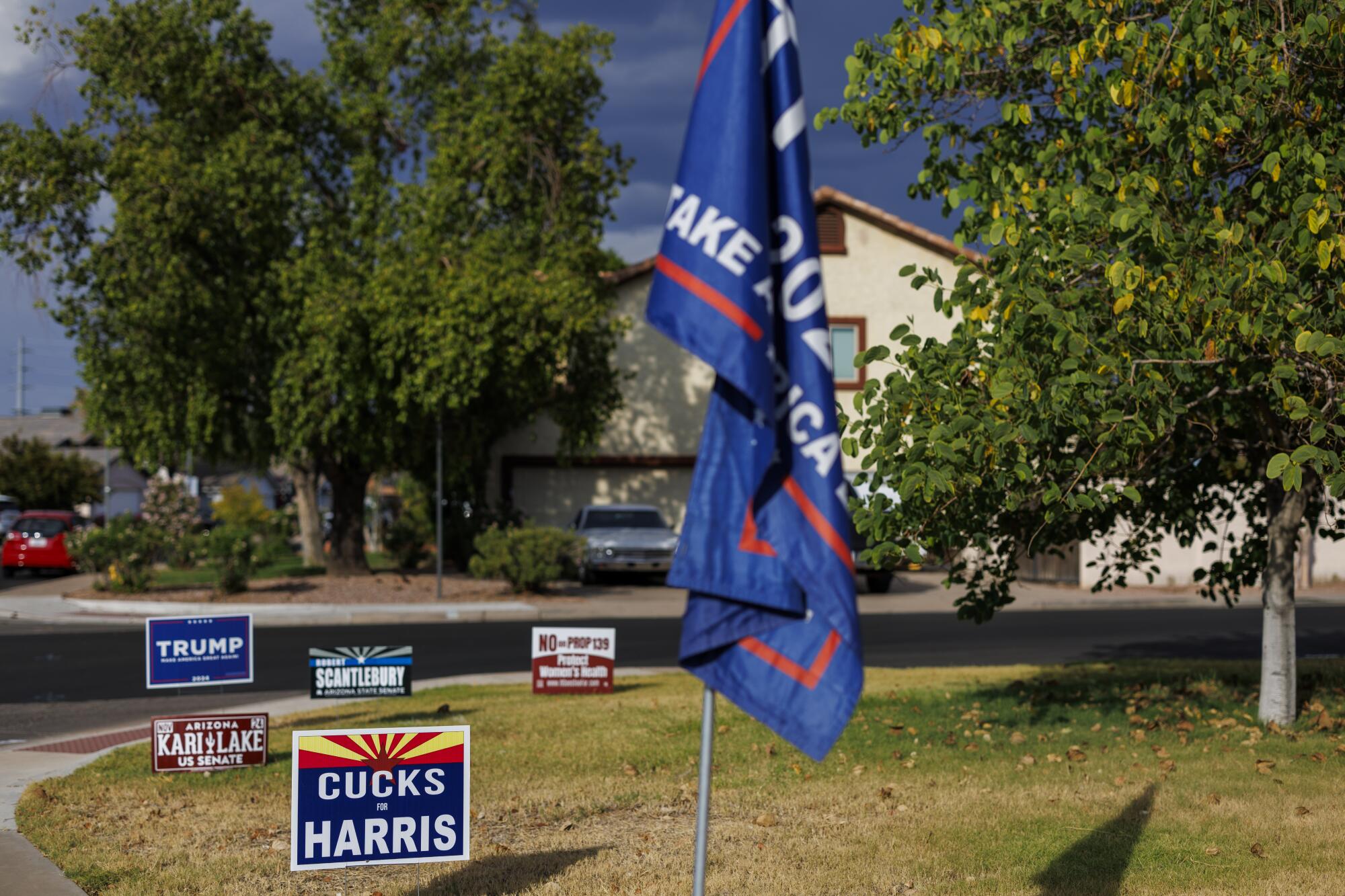
After Julie Spilsbury put up a “Republicans for Harris-Walz” sign, her neighbor put up a derogatory “Cucks for Harris” sign.
(Gina Ferazzi / Los Angeles Times)
“For the sake of the relationship that we have as neighbors and at church, this isn’t good,” Spilsbury recalled saying. “This doesn’t help our relationship, and I’d hope that that would be more important to you.”
“Yeah, unity is really important to me as well. But sometimes Christ goes into the temple and turns over the tables of the money changers. It’s not always kumbaya,” Rowland told a Times reporter.
She said she just wanted a simple answer: What was Spilsbury’s problem with Trump? “You can’t vote for somebody just because you hate somebody else. And voting for someone because of your hatred for someone else, that’s not unity either. That’s Satan.”
Spilsbury said later that he hadn’t intended to debate which candidate was stronger. He wanted to know why his fellow church member would post a sign so blatantly insulting.
The neighbors argued back and forth and “voices were raised,” Spilsbury said. After about 45 minutes, he walked home.
The Rowlands’ sign stayed put — along with a Trump banner and an upside-down American flag.
-
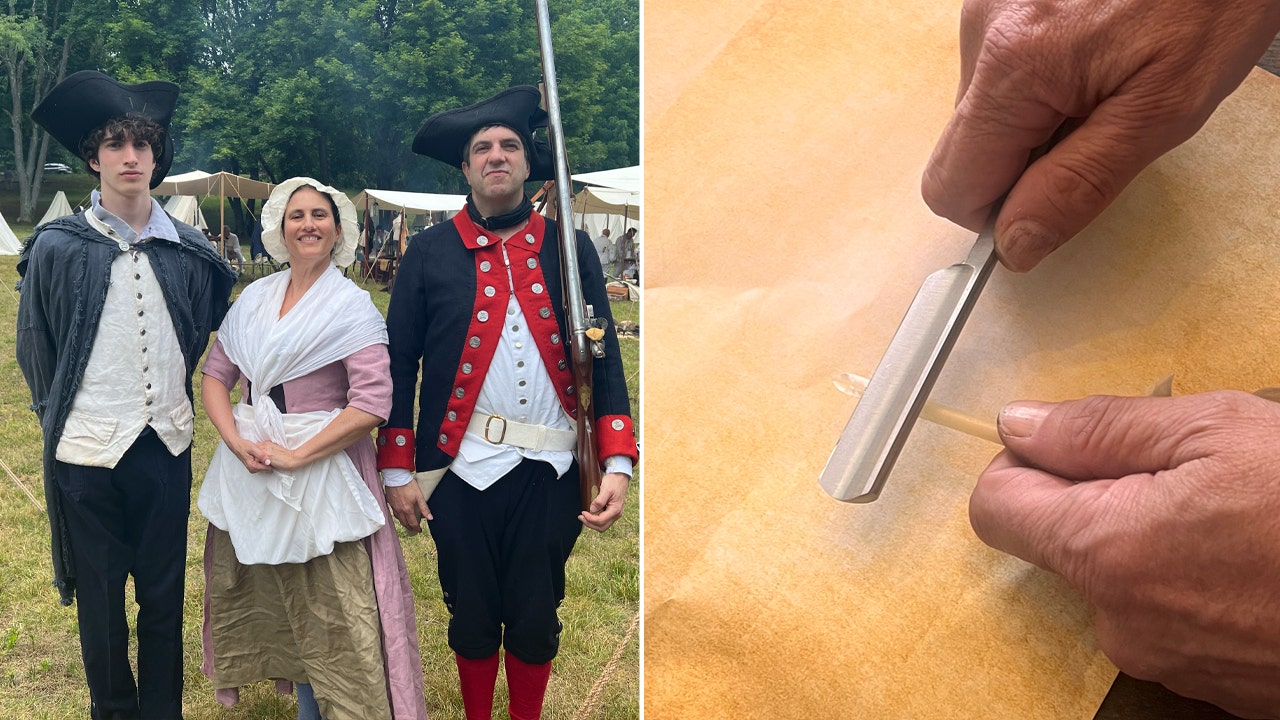
 Health1 week ago
Health1 week agoHealth, happiness and helping others are vital parts of free and responsible society, Founding Fathers taught
-

 Sports1 week ago
Sports1 week agoFreddie Freeman says his ankle sprain is worst injury he's ever tried to play through
-

 News1 week ago
News1 week agoLebanon says 50 medics killed in past three days as Israel extends its bombardment
-

 Entertainment4 days ago
Entertainment4 days agoHold my beer can: Museum says a worker thought unique art installation was trash
-

 Entertainment5 days ago
Entertainment5 days ago'The Office' star Jenna Fischer reveals private breast cancer battle: 'I am cancer free'
-
/cdn.vox-cdn.com/uploads/chorus_asset/file/25673932/462754179_560996103109958_6880455562272353471_n.jpg)
/cdn.vox-cdn.com/uploads/chorus_asset/file/25673932/462754179_560996103109958_6880455562272353471_n.jpg) Technology2 days ago
Technology2 days agoMeta suggests AI Northern Lights pics are as good as the real thing
-

 Technology4 days ago
Technology4 days agoScammers exploit grief with fake funeral streaming on Facebook
-

 Lifestyle1 day ago
Lifestyle1 day agoIs the free speech debate dead? Plus, the devil! : It's Been a Minute



















